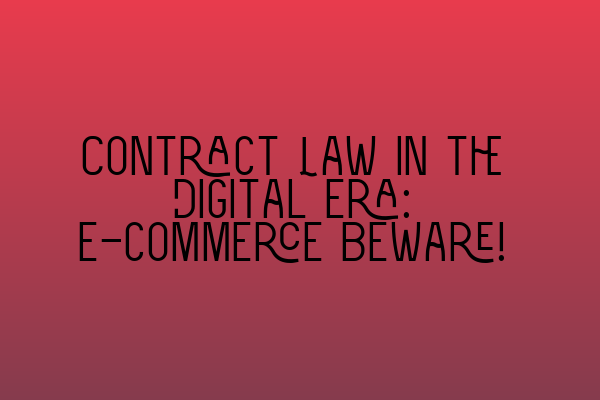Contract Law in the Digital Era: E-commerce Beware!
The rise of the digital era has revolutionized the way we do business. E-commerce has become an essential part of our everyday lives, allowing consumers to purchase goods and services with just a few clicks. While this convenience has undoubtedly made our lives easier, it has also brought forth a myriad of legal issues that businesses must navigate carefully. In this article, we will explore the impact of contract law in the digital era and highlight key considerations for e-commerce businesses.
The Importance of Clear and Enforceable Contracts
Contracts form the foundation of all business transactions. In the digital era, however, the nature of contracting has undergone a significant transformation. Traditional paper contracts have given way to electronic contracts, which are often presented in the form of terms and conditions on websites or mobile apps.
For e-commerce businesses, it is crucial to have clear and enforceable contracts to protect their rights and limit their liabilities. Traditional contract law principles still apply in the digital world, such as offer and acceptance, consideration, and intention to create legal relations. However, the challenge lies in adapting these principles to the unique characteristics of online transactions.
One of the challenges in e-commerce contracts is ensuring that the terms and conditions are effectively communicated to the customers. This can be achieved through the use of prominent and easily accessible hyperlinks that direct users to the full terms and conditions.
Recent cases have emphasized the need for businesses to ensure that customers have reasonable notice of the terms and conditions before making a purchase. The courts have placed importance on factors such as the size and prominence of the link, the clarity of the wording, and the ease of access to the terms and conditions.
It is also important for businesses to regularly review and update their contracts to ensure compliance with the ever-changing legal landscape. In this regard, seeking legal advice from a qualified contract law solicitor can be invaluable.
The Risks of Boilerplate Contracts
In the fast-paced world of e-commerce, many businesses resort to using boilerplate contracts to streamline their operations. While boilerplate contracts may offer convenience, they can also pose significant risks.
A boilerplate contract is a standard form contract that is used repeatedly without significant modifications. While these contracts may seem efficient, they often fail to address the unique circumstances of each transaction. This can lead to ambiguity and disputes down the line.
When it comes to e-commerce, the use of boilerplate contracts can be particularly risky. Each transaction may involve different goods, services, or terms, and failing to tailor the contract to the specific circumstances can have adverse consequences.
To mitigate the risks associated with boilerplate contracts, businesses should consider customizing their contracts to reflect the specifics of each transaction. This can be achieved through the use of dynamic contract templates that allow for easy modifications based on the individual requirements of each deal.
Additionally, seeking legal advice to review and draft customized contracts can help e-commerce businesses minimize risks and protect their interests.
The Impact of Consumer Protection Legislation
E-commerce businesses must also take into account various consumer protection legislation that applies to their operations. Consumers have legal rights when purchasing goods or services online, and businesses must comply with these rights to avoid legal repercussions.
For example, the Consumer Rights Act 2015 provides consumers with rights to obtain a refund, repair, or replacement for faulty goods or services. E-commerce businesses are also required to provide clear information about pricing, delivery, and cancellation rights.
Ignorance of consumer protection legislation is not a valid excuse for non-compliance. It is crucial for e-commerce businesses to familiarize themselves with these laws and ensure that their practices align with the legal requirements.
The Role of SEO in E-commerce Contracts
As an SEO expert, I understand the importance of integrating relevant keywords to improve search engine visibility. In the context of e-commerce contracts, SEO can play a crucial role in ensuring that the contract terms are easily searchable and accessible to consumers.
By incorporating keywords related to the specific goods or services offered, businesses can increase the likelihood of their contracts being discovered by potential customers. This can help in attracting qualified leads and ultimately enhancing business growth.
In addition to keywords, it is important to consider other SEO factors such as meta tags, title tags, and meta descriptions when drafting e-commerce contracts. These elements can improve the visibility and click-through rate of the contracts in search engine results.
Conclusion
In the digital era, e-commerce businesses must navigate the complexities of contract law to protect their rights, limit their liabilities, and ensure compliance with consumer protection legislation. Clear and enforceable contracts, customized to the specifics of each transaction, are essential. E-commerce businesses must also stay up to date with the ever-changing legal landscape and seek legal advice when necessary.
By understanding the impact of contract law in the digital era and integrating SEO strategies, e-commerce businesses can thrive in the competitive online marketplace.
Related articles:
- Exploring the Impact of Frustration on Contractual Obligations: Legal Insights
- Interpreting Contractual Clauses: Unlocking the Hidden Meanings
- Legal Aspects of Business Contracts: Key Considerations for Entrepreneurs
- SQE Contract Law vs. Traditional Qualifications: A Comparative Analysis
- Agreements in Contract Law: Understanding Its Various Types
